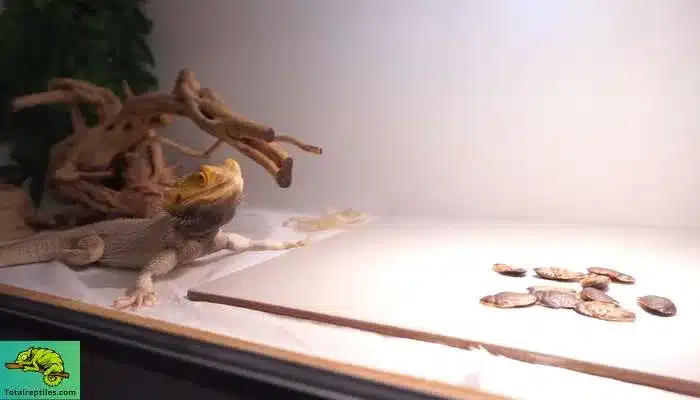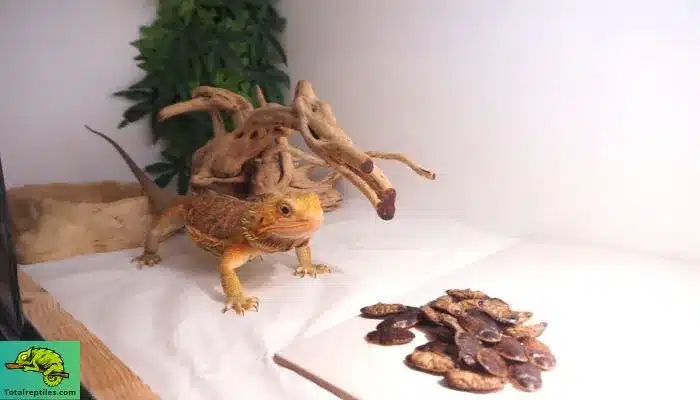Many reptile pet stores supply various ranges of Dubia roaches, as they are a favorite of omnivorous or insectivorous pets. But can bearded dragons eat Dubia roaches?
They are one of the best nutritious snacks for your beardies. Dubia roaches are meaty, juicy, and easy on the digestive system. The only downfall is the lack of calcium minerals that you may have to dust on the insects before feeding.
There is a lot to know about these roaches. We have done the most extensive research on the topic to establish the following information. Read on to learn more!

Can Bearded Dragons Eat Dubia Roaches?
Dubia roaches (Blaptica Dubia) are also recognized as orange-spotted, tropical-spotted, Guyana-spotted, or Argentinian wood roaches. They are of the cockroach species, of course.
Now, life is quite different in captivity for a bearded dragon than in the wild. Domesticated dragons rely on you to choose their daily meals.
In that case, you can consider making Dubia roaches a consistent part of a balanced diet to provide fueling nutrients regularly.
Besides, beardies enjoy the taste and love how these roaches do not fly around or bite. You can say that they are the easiest prey for the reptile to munch on.
Are dubia roaches good for bearded dragons?
Dubia roaches offer practically everything your dragon may require to stay healthy and active, making these insects advantageous for a balanced diet.
Are Dubia Roaches good for bearded dragons? Well, here are some reasons why they are one of the best choices:

- Dubia roaches are loaded with protein while delivering low fat.
- They have five times the nutritional value of other live insects.
- These roaches are super easy to digest, thanks to the nominal chitin presence in their exoskeleton.
- You can customize the roach’s nutrients by gut-loading them with healthy food items that your beardie will eventually need.
- Dubia roaches have the perfect sizes; you can select from small to large, based on the dragon’s age.
- They are one of the favorites of pet reptiles to chase and catch. It enables interactive eating habits to keep the wild side of the dragon alive.
- Dubia roaches will not startle your beardie, especially if it is timid.
- They are low-maintenance and budget-friendly.
Risks and Precautions of Feeding Dubia Roaches to Bearded Dragons
Based on a study, we have been able to determine that Dubia roaches have a higher protein content when compared with other feeding sources. However, a couple of risks are associated with Dubia roaches, one specifically concerning overfeeding.
As much as the beardies love these neat roaches, ensure you provide only the essential amounts as a staple. Dragons have a small stomachs, so excess consumption can lead to impaction and other health issues.
Also, choose the roach size carefully according to the dragon’s current age. The feed should not be bigger than the width between the beardie’s eyes. This detail is crucial if the pet is still a baby or juvenile.
How to Feed Dubia Roaches to Bearded Dragons?
You can do the following if it is your first time handling the Dubia roaches:
- Always give live feeds to your beardies.
- Make sure each roach is clean as well.
- Try to feed them directly by placing one before the dragon’s mouth.
- Ensure the roach is small enough to fit the width between the dragon’s eyes.
- It is better to feed one Dubia roach at a time for a given period.
- Baby and juvenile beardies will require larger quantities of roaches than adult beardies.
- You can place the insect into a shallow bowl inside the enclosure.
- Gut-load the Dubia roaches with vegetable and fruit slices 24 hours before serving.
- Remove any uneaten or half-eaten roach from the tank every 24 to 48 hours.
- Although offering live roaches is ideal, you can cut them up into bite-sized pieces for a beardie if necessary.
Want to learn more about the bearded dragon diet:
Can bearded dragons eat beetles?
Can bearded dragons eat cockroaches?
Can bearded dragon eat dead crickets?
Can Bearded Dragons Eat Dubia Roaches Every Day?
Yes, they offer excellent nutrient sources that other insect matter may lack. Since these roaches have a low-fat content, it is okay to feed them to your beardie regularly.
However, a full-grown dragon must have a 70–80% of plant matter alongside. You can leave the roaches to fill the remaining space on the platter.
The abundant nutrients in Dubia roaches make them safer options than other insects with higher fat content. And the more fat an insect or larva contains, the greater the risk of obesity in a beardie.

Thankfully, you will not have to stress about that with Dubia.
How Many Dubia Roaches to Feed a Bearded Dragon?
The table below shows the nutritional value of male, female, and nymph Dubia roaches.
| Moisture | Protein | Fat | Ash | Chitin | |
| Male | 62.70% | 54.32% | 35.51% | 4.17% | 4.38% |
| Female | 61.46% | 52.87% | 35.49% | 3.69% | 5.58% |
| Nymph | 59.06% | 47.50% | 44.22% | 2.47% | 3.83% |
As you can see, some of the key nutrients are present in greater amounts in Dubia roaches. The calcium and iron levels are also adequate to keep the beardie happy and healthy.
Hence, offer about 3 up to 50 roaches a day after checking the age and weight. Remember that baby and juvenile dragons consume more roaches daily at 3 to 4 intervals, whereas adults eat only a few.
Can You Leave Dubia Roaches in Bearded Dragon Tank?
In general, you should not leave live insects inside your dragon’s enclosure for more than 24 hours. You should also remove the ones that it has not eaten or touched for the next meal.
When it comes to Dubia roaches, they are harmless, quiet, and slow. They will not fly and cause anxiety to the pet reptile. So you may leave the roach for a little more than 24 hours.
Can Bearded Dragons Eat Dead Dubia Roaches?
In our extensive evaluation of this matter, we discovered that roaches are best served alive and gut-loaded. Dragons will seek out live protein as part of their native trait.
Dead roaches seem like a neat idea to avoid handling live ones, and they may contain parasites or other harmful substances. If your dragon ingests these, the consequences can be detrimental.
However, some owners offer dried Dubia roaches, which we believe should be provided in moderation only.
Can Baby Bearded Dragons Eat Dubia Roaches?
Baby dragons need more protein supplements to grow and learn to defend themselves. Thus, they will necessitate 50-70% of insect matter in their diet.
The problem is that the insect selection range is further narrowed for a baby beardie than a mature one. Luckily, Dubia roaches can save your day from searching too far and prevent your dragon from malnourishment.
In short, you can certainly feed these roaches to your baby beardies several times daily. Just make sure the size complements the distance between their eyes to avoid choking.
Can Juvenile Bearded Dragons Eat Dubia Roaches?
Juveniles are hyperactive and aggressive in their developing stages. So, they need copious protein sources multiple times a day.
What better way to sustain them than with Dubia roaches, which are harmless and easy to procure?
Feed your juvenile dragon at least up to 50 roaches a day by dividing the number throughout the several meal courses.
Their insect matter consumption rate is almost 70%. Hence, feed them as many gut-loaded Dubia roaches as possible without getting indigestion. And ensure the insect size is smaller than the beardie’s head.
Other Feeder Insects for Bearded Dragons
We recommend sorting the feeder insects into two categories – staple and infrequent.
It will help you understand which ones are safe to give regularly and which are better served as occasional treats.

Glowing insects should be avoided at all costs because they have a particular toxin lethal for pet dragons. The same applies to boxelder bugs.
On a similar note, wild-caught insects have no guarantee that they have had a parasite-free life. Do not feed your pet any of these, even if it is an edible roach, for fear of disease or pesticide contamination.
Conclusion
So, can bearded dragons eat Dubia roaches? Or should you offer them to your beloved reptile friend?
Yes, your bearded dragon can indeed eat these roaches and find them quite appetizing!
Moreover, they are an excellent choice due to the balanced calcium-to-phosphorus ratio and high nutritional value, which contribute to the overall health and well-being of your beardie.
Remember the importance of roach size and obtain them from reputable breeders. Lastly, enjoy watching your dragon thrive on a varied and nourishing diet that comprises Dubia roaches.
References
- Boyer, Thomas. H., ‘Diseases of Bearded Dragons’, Proceedings of the Pacific Veterinary Conference (2015)
- Care, Bearded Dragon. ‘ragon’ (2013)
- Yee, Lam Pei, (et al.), ‘Nutrient composition of Blaptica dubia (Order: Blattodea) as an alternative protein source’, (2018)
- Raiti, P. ‘Husbandry, Diseases, and Veterinary Care of the Bearded Dragon (Pogona Vitticeps)’, Journal of Herpetological Medicine and Surgery (2012).
- Barboza, T. (et al.), ‘Survey of Feeding Practices and Supplement Use in Pet Inland Bearded Dragons (Pogona vitticeps) of the United States and Canada’, Journal of Herpetological Medicine and Surgery (2022)

